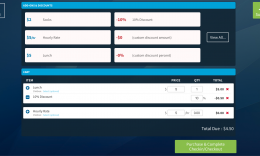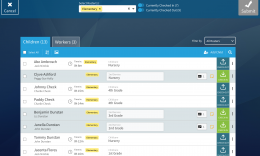The Cost of the Constant Hustle

If you spend any time on social media, you’ll see hashtags such as #sleepisforlosers, #riseandgrind, and #hustlehard. Our culture is obsessed with long work hours, busyness, and constant achievement. We praise grueling schedules, glorify busyness, and constantly look for ways to perform the next miracle. Unfortunately, the more we strive for the finish line, the farther away it seems to become.
The Journal of Youth Development shared research regarding the cascading effects of stress on workers and attendees in out-of-school learning programs and human-serving occupations. In a nutshell, these professions are challenging and take both a physical and emotional toll on those serving and those attending. The research was clear we need to create environments that foster healthy resiliency, reduce stress, and offer workers a much-needed respite from the continual grind.
Those working with kids and youth know first-hand how challenging it is to slow down and make changes. Here are six simple ways to reduce the pressure to perform, gain a healthy perspective on serving, and create a not-so-stressful environment for staff, volunteers, and attendees.
1. Prioritize Wellness
Everyone feels valued when they believe leadership is looking out for their health and wellbeing. Encourage workers and volunteers to get outside during breaks and enjoy nature. Hold a steps contest with fun prizes. Stock up on fresh and healthy snacks. Bring in a water purifier so people can fill up their water bottles at no expense. Schedule one monthly meeting with an activity such as a hike, healthy potluck, or bike ride – it’s nice when people can participate during a typical workday and don’t have to change their schedule.
2. Environment Matters
It’s been said that if workers and attendees love the environment, they will love serving and attending. The environment can either increase or decrease stress. If needed, update the color scheme, add pictures of volunteers and staff, remove any barriers to engagement by opening things up. If there’s a common gathering place, consider adding plants and comfortable places to sit and chat. Make sure that families are warmly greeted and have their questions answered. Make sure the check-in area stands out with someone available to help new families set up and learn the process.
3. Cultivate New Habits
Encourage staff and volunteers to offer ideas for making improvements. Be open to those conversations you’ve heard that people need additional flexibility or want schedule changes. Ask around and see what people want and need. If you sense a person is feeling stressed, investigate and see what’s going on. Offer a half-day off so they can take care of things, run errands, and get caught up. Allow changes to start and end times for shifts or workdays. Consider having a “No Meeting Mondays” where time is dedicated to helping people focus, clean up outstanding tasks, and better manage workload. These small gestures of flexibility are often great for morale, and people always appreciate they are trusted.
4. Breathing Room
Research indicates that 80 percent or more of disengaged and hostile workers and volunteers preferred the opportunity to take a break. It’s necessary for people’s health and wellbeing. So encourage long-time workers and volunteers to take breaks and recharge. Sometimes just knowing the option exists to take a break from service helps eliminate stress and performance anxiety.
5. Incorporate a “Digital Sabbath”
Jotform defines a “digital sabbath” as a day that avoids email, social media, and all general technology. It doesn’t necessarily have to be on Sunday and can be any day you choose. Taking one day off can help improve sleep, reduce anxiety levels, and boost mental and physical health. It may take some discipline, but the benefits will be quickly realized.
6. Ask for Help
As a leader, you should never feel ashamed to ask for help. Identifying a knowledge gap is a sign of strength. Seek out mentors, peers, or other human resource professionals for direction and support. Take advantage of spending more time with friends and family and encourage others to do the same. That time will keep people grounded and offer a reminder of what’s essential.
The cost of nonstop hustling is genuine. Hundreds of studies cite the connection between overwork and the effects on a person’s life, health, and wellbeing. The issue isn’t a lack of information or proven data points; it’s how do you use the information to make changes. Start small, and the rest will follow.
Click here to learn more about the benefits of using secure children’s Check-In, subscribe to the KidCheck blog, or join our growing social community. You can find us on YouTube, Twitter, Facebook, Pinterest, and Instagram.


